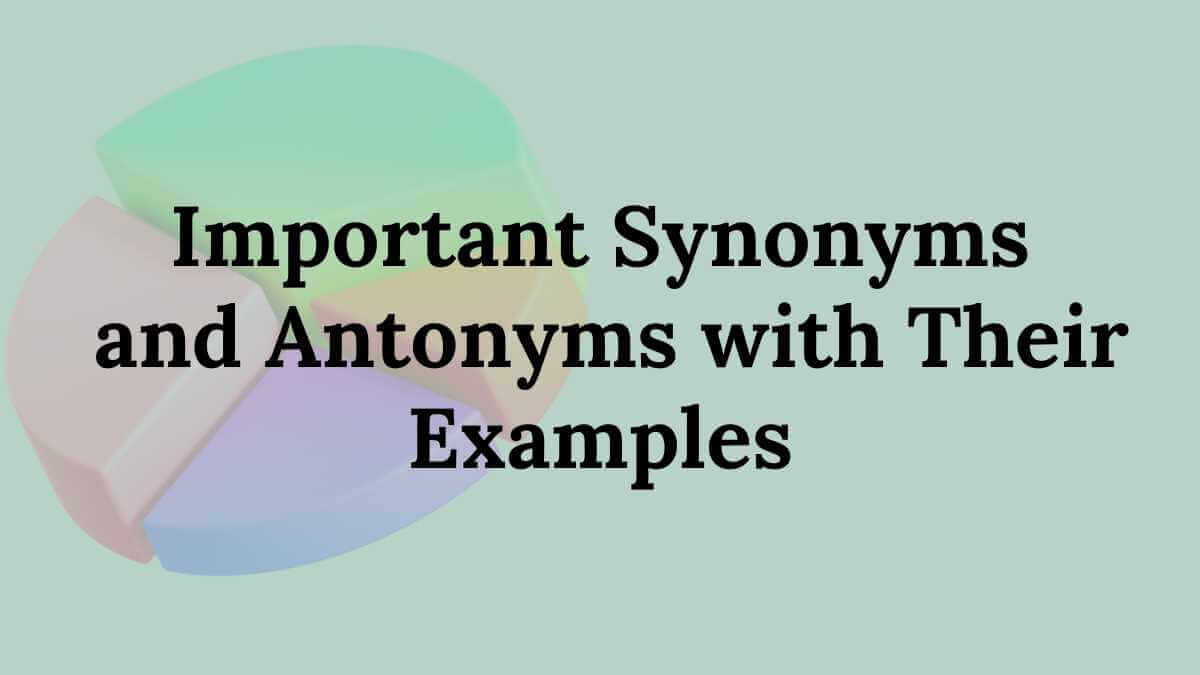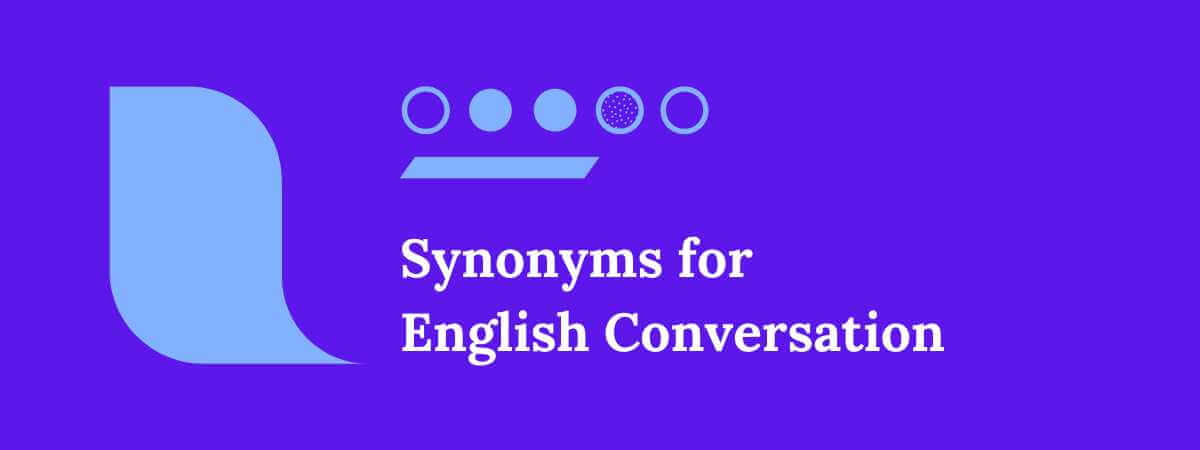Synonyms and antonyms are essential parts of the English vocabulary. Synonyms help us express the same idea in different words, while antonyms show the opposite meaning. Learning them improves writing, speaking, and understanding skills. This guide provides important synonyms and antonyms with clear examples to make learning easier and more practical for everyday use.
Synonyms
Synonyms are words that have the same or nearly the same meaning as another word. For example, the words big and large mean almost the same thing. Using synonyms makes writing and speaking more interesting because it helps avoid repeating the same word again and again. They also allow us to express ideas more clearly and creatively.
Learning synonyms is important for building a strong vocabulary. Writers use them to make their sentences more natural and smooth, while speakers use them to sound more fluent. For students, synonyms are very useful in exams and essays, as they improve both clarity and style. By practising synonyms daily, anyone can improve their English communication skills effectively.
Antonyms
Antonyms are words that have opposite meanings. For example, hot and cold are antonyms because they express completely different ideas. Using antonyms helps us show contrast in our writing and speaking. They are very useful when we want to explain differences, highlight opposites, or make our sentences more powerful and clear.
Learning antonyms is an important part of vocabulary building. They improve understanding of word meanings and help in expressing thoughts more effectively. Students often use antonyms in essays, comparisons, and exams to make their writing stronger. Practising antonyms also develops quick thinking in conversations.
Synonyms and Antonyms with Examples
Strong – Weak = He looks weak after the long illness.
Fast – Slow = The old man walks very slow.
Hot – Cold = The water feels cold in winter.
Light – Heavy = This box is too heavy to carry.
Tall – Short = She is short compared to her sister.
Big – Small = The room is small but comfortable.
Near – Far = The village is far from the city.
High – Low = The sound is too low to hear.
Thick – Thin = His body looks very thin.
Young – Old = My grandmother is very old.
Soft – Hard = The ground is hard after the rain.
Sharp – Dull = This knife has become dull.
Open – Close = Please close the window.
Sweet – Sour = The grapes taste sour.
Day – Night = Stars appear at night.
Full – Empty = The basket is empty now.
Inside – Outside = The children are playing outside.
Begin – End = The movie will end soon.
Buy – Sell = He wants to sell his old car.
Give – Take = She will take the money.
Right – Wrong = Boby is wrong in her decision.
Kind – Cruel = Don’t be cruel to the poor.
Polite – Rude = You should not be rude to your relatives.
Old – New = I have bought a new shirt.
Push – Pull = Please pull the door to open it.
Love – Hate = Some people hate working hard.
Gain – Lose = He may lose the match.
Win – Lose = Our team did not lose yesterday.
Come – Go = You should go now.
Stand – Sit = Please sit in the chair.
Laugh – Cry = The baby began to cry.
Arrive – Leave = The students will leave soon.
Sing – Dance = She loves to dance on stage.
Increase – Decrease = Prices may decrease next month.
Enter – Exit = They exit through the back door.
Ask – Answer = Please answer my question.
Start – Finish = The race will finish at noon.
Create – Destroy = War can destroy a country.
Build – Break = Don’t break the rules.
Allow – Forbid = Smoking is forbid here.
Agree – Disagree = I disagree with your opinion.
Accept – Refuse = She decided to refuse his proposal.
Connect – Disconnect = Please disconnect the power.
Catch – Miss = He may miss the bus.
Beautiful – Ugly = The crow is an ugly bird.
Mortal – Immortal = Man is not immortal.
Victory – Defeat = The people of Germany defeated the USA.
Careful – Careless = She is careful while driving, but her brother is careless.
Useful – Useless = This tool is useful, but the broken one is useless.
Hopeful – Hopeless = She is hopeful about success, but he feels hopeless.
Colourful – Colourless = The painting is colourful, but the sky looks colourless.
Arrive – Depart = The plane will depart at 9 p.m.
Mary – Divorce = They got divorce last year.
Work – Rest = You should rest for some time.
Borrow – Lend = Can you lend me some money?
Include – Exclude = Please exclude my name from the list.
Correct – Incorrect = The answer is incorrect.
Safe – Dangerous = The road is dangerous at night.
True – False = His story turned out to be false.
Rich – Poor = Many people are poor in that area.
Happy – Sad = She felt very sad yesterday.
Friend – Enemy = He treats me like an enemy.
Strong – Weak = The bridge is too weak to hold the weight.
Early – Late = He always arrives late.
Alive – Dead = The bird is dead.
Love – Hate = They hate cheating.
Brave – Coward = Don’t be a coward.
Sharp – Blunt = The knife is blunt.
Victory – Defeat = They suffered a heavy defeat.
Gain – Loss = The shop made a big loss.
Joy – Sorrow = She is in deep sorrow.
Peace – War = Nobody wants war.
Present – Absent = He was absent yesterday.
Love – Hatred = Their hearts are full of hatred.
Right – Wrong = His answer is wrong.
Polite – Rude = The boy was very rude.
Success – Failure = He faced complete failure.
Sweet – Bitter = The medicine tastes bitter.
Beautiful – Ugly = The painting looks ugly.
Victory – Loss = The team faced a huge loss.
Friend – Foe = He turned out to be a foe.
Care – Carelessness = His care saved the child, but her carelessness caused the problem.
Cheerful – Cheerless = The child is cheerful, but the empty room feels cheerless.
Active – Inactive = She is active in sports, but her brother is inactive.
Regular – Irregular = He takes regular classes, but my attendance is irregular.
Honest – Dishonest = He is honest, but his friend is dishonest.
Pure – Impure = This water is pure, but that one is impure.
Control – Decontrol = The teacher keeps control, but the game went into decontrol.
Common – Uncommon = English is common, but Sanskrit is uncommon.
Sense – Nonsense = Your idea makes sense, but his talk is nonsense.
Educated – Uneducated = She is educated, but her neighbor is uneducated.
Literate – Illiterate = He is literate, but many villagers are illiterate.
Accept – Reject = I will accept the gift, but you may reject it.
Truth – Lie = He told a lie.
Good – Evil = The king fought against evil.
Fast – Slow = The turtle moves slow.
Useful – Useless = This pen is useless.
Honest – Dishonest = The trader was dishonest.
Hopeful – Hopeless = The case looks hopeless.
Clear – Unclear = The message is unclear.
Simple – Complicated = The process is complicated.
Modern – Ancient = This tradition is ancient.
Regular – Irregular = His attendance is irregular.
Positive – Negative = He has a negative attitude.
Possible – Impossible = This task seems impossible.
Visible – Invisible = The stars are invisible now.
Happy – Unhappy = She looks unhappy.
Useful – Futile = The effort was futile.
Bright – Dark = The room is dark.
Healthy – Sick = The child looks sick.
Safe – Unsafe = The area is unsafe.
Pure – Impure = The water is impure.
Active – Passive = He remained passive.
Young – Aged = The worker is aged.
Wide – Narrow = The road is narrow.
Deep – Shallow = The water is shallow.
Happy – Miserable = She felt miserable.
Polite – Impolite = The remark was impolite.
Clean – Messy = His room is messy.
Strong – Fragile = The glass is fragile.
Rich – Needy = They helped the needy.
Good – Wicked = He acted wicked.
Alive – Lifeless = The flower is lifeless.
Good – Bad = He is a good boy, but his habit is bad.
Rich – Poor = The rich help the poor.
Early – Late = I came early, but he came late.
Dead – Alive = The fish is dead, but the bird is alive.
Bear – Drop = Drop the gun now.
calm – Agitated = Don’t be agitated now.
Early – Late = A late riser can’t have good health.
Die – Live = You should struggle to live in the world.
Clean – Dirty = This place is very dirty.
Damage – Benefit = Early rising has a lot of benefits.
Fertile – Barren = You can not grow anything in a barren land.
Trust – Distrust = He distrusts his wife.
Refuse – Accept = I cannot accept your offer.
Artificial – Natural = The flowers I gave you were natural.
Conscious – Unconscious = They are unconscious.
Brave – Timid = The girl is very timid.
Happy – Sad = The matter is very sad.
Evil – Good = I am not so good.
Famous – Notorious = He is a notorious thief.
Great – Small = The house is small.
Timid – Brave = He is brave.
Clear – Indistinct = The cause of the murder is still indistinct.
Difficulty – Ease = He passed the examination with ease.
Ability – Inability = Illiteracy means the inability to read and write.
Probable – Certain = It is Certain that he will attend the party.
Cruelty – Kindness = Kindness is a great virtue.
Accelerate – Retard = This retard our success.
Fault – Perfection = We found perfection in his work.
Defend – Attack = The patrol cam is under attack from all sides.
Brief – Long = It’s a long story.
Moderate – Immoderate = Please give up your immoderate views about political leaders.
Confirm – Oppose = I would oppose changing the law.
Definite – Indefinite = I cannot allow you to borrow an essential book like ‘Oxford Advanced Learner’s Dictionary’ for an indefinite period of time.
Honest – Dishonest = Beware of dishonest traders in the tourist areas.
Legal – Illegal = It’s illegal to drive through a red light.
Slowly – Speedily = The work was done slowly, but the reply came speedily.
Ambiguous – Unambiguous = The message is clear and unambiguous.
Complexity – simplicity = The simplicity of the architecture charmed us.
Similar – Different = American English is significantly different from British English.
Idle – Active = Although he’s nearly 80, he is still very active.
Modern – Outdated = These fashions are now outdated.
Timid – Courageous = The timid boy stayed quiet, but the courageous girl spoke up.
Conclusion
Synonyms and antonyms are fundamental for improving English vocabulary and communication. While synonyms help us express the same idea in different ways, antonyms allow us to show contrast and opposite meanings. Practising them regularly makes writing and speaking more effective, creative, and fluent. By understanding and using these words, anyone can enhance their English skills and communicate with confidence.

